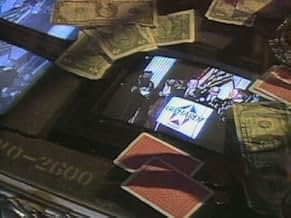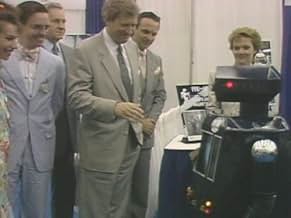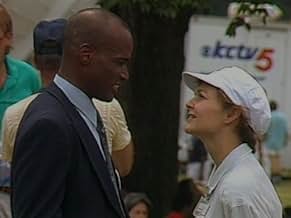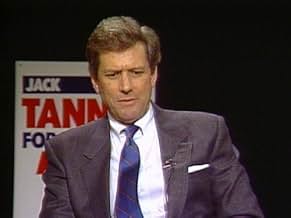अपनी भाषा में प्लॉट जोड़ेंA behind-the-scenes look at a former Michigan U.S. Representative's campaign as he vies for his party's Presidential nomination.A behind-the-scenes look at a former Michigan U.S. Representative's campaign as he vies for his party's Presidential nomination.A behind-the-scenes look at a former Michigan U.S. Representative's campaign as he vies for his party's Presidential nomination.
- 1 प्राइमटाइम एमी जीते
- 4 जीत और कुल 3 नामांकन
फ़ीचर्ड समीक्षाएं
Renegade filmmaker Robert Altman and Pulitzer-winning Doonesbury cartoonist G.B. Trudeau created the Jack Tanner character, but they couldn't hope to predict the frenzy he'd create. Politicians were eager to meet him, and more than happy to pretend they knew him. If it would make them look good, of course. Everyone from Pat Roberston to Bob Dole happily talked to Jack and his crew, knowing he had a media blitz surrounding him. The catch is they didn't know why he had a blitz around him.
Altman and crew were constantly filming Michael Murphy as he took the Tanner role and ran with it, frequently improvising, as Trudeau couldn't keep up with the goings-on well enough to script half of what Murphy did. What Trudeau did script was the behind-the-scenes action of the Tanner campaign. Campaign Manager T.J. Cavanaugh (masterfully portrayed by Pamela Reed) and her slew of assistants hustled and bustled in their HQ, desperately trying to spin everything Jack did to make him look 'For real', so as to match his slogan. Unfortunately, as T.J. put it, 'things happen to this man'.
Tanner has a lot of problems both in front of and behind the camera. First there's the camera-man Deke, who reads Jack's diary and puts his personal thoughts into campaign commercials and, after being fired, joins the NBC news crew that is assigned to follow Jack, which gives Deke even more chances to ruin Jack's life. Secondly there's the fact that Jack has fallen deeply in love with Michael Dukakis' (fictitious) campaign manager, Joanna Buckley. Thirdly, Jack's daughter, Alex, bounces between free-spiritedness and megalomania, both of which make Jack look bad. Last, but not least, is the fact that Jack never takes a definite stance on anything except drug legalization. This makes him look like more of a hippy than a politician.
Over the course of six hours and eleven episodes, Altman and Trudeau use their characters and the real politicians to weave a brilliant fable about the state of politics in a world where image means more than qualifications and standards. Pathetic as it may be, it's true. In most of the encounters Jack has with politicians it is quite clear that these people have no idea what is going on, yet they still pretend to be completely in control. When we put them in the White House, do they know what they're doing or are they just pretending to be completely in control? "Tanner '88" is a mockumentary that actually has a point, and makes that point very well.
This one is as brilliant, funny and thought-provoking as the best of the writer and director's solo projects. All the performances are terrific -- Pamela Reed, in particular, shows why she's one of the most interesting American actresses working today.
The mini-series of 10 half-hour episodes is available on three VHS tapes.
It was excellent, overall. Especially good was the way it punctured so many of the hot-air balloons and pretensions of American politics, but clearly sympathized with the people who want to believe in it. We see a liberal Democratic candidate, Jack Tanner, played skillfully by Michael Murphy, go through a campaign from the New Hampshire primary to the end of the convention. Typical of the series, Tanner is on the one hand shallow and full of empty rhetoric, while also sincere, idealistic and sometimes inspiring. Tanner's campaign manager, a woman, is also extremely smart, more than a little cynical, but capable of being inspired by her candidate whose weaknesses she knows very well. The first half of the series, which takes place in New Hampshire, is extremely funny, especially in showing how the citizens there have become inured to the hoopla of the candidates and the media. Also outstanding in this series is the way the working press is portrayed as part of the life of the campaign--these are real people, not just role players. The last two episodes, at the convention, lack the bite of the first five or or six, and could be skipped without losing much.
The premise is creative, and Jack Tanner and TJ Cavanaugh are great characters. Everyone else though is either forgettable or immensely unlikeable. Deke, Molly, and Andrea are perhaps the most annoying. Deke, the cameraman, always manages to be creepy and shove cameras in people's faces for avant-garde documentary footage. The news reporter Molly shows up ready to fly off the handle over not getting a good story. While Andrea, a Tanner campaign employee, does toughen up, she never looses that underlying whiny naivety that makes you wonder how she wound up working for a political campaign in the first place.
In addition, the plot lines of episodes don't seem all that focused. They will usually pick up with the aftermath of what the last episode closed with and then move to something else, with the aftermath being dealt with in the following episode. It seems like each episode contained two halves of a different story. The end of the former episode and the beginning of the latter should have all just been one episode.
And yet, Tanner '88 seems to have moments that pull you back in when you've gotten annoyed with it. There's the speech at the end of the first episode (which may be the best episode), the cameos with other candidates and notable figures, and numerous scenes where TJ, always the commanding workaholic, is deftly managing a difficult campaign.
By no means is this a bad show. However, I definitely expected more from it, especially considering that this was an inspiration to the superior political drama: The West Wing.
क्या आपको पता है
- ट्रिवियाAaron Sorkin has acknowledged that this miniseries had an influence on The West Wing (1999), which he created, in its underlying idealism, and in its view of political staffers as people who at least struggle to do the right thing.
- भाव
[making a toast at his son's wedding rehearsal dinner]
Tanner's Father: One hundred years ago, William Gladstone, after a particularly acrimonious debate in Parliament, bellowed across the floor at his arch-rival Benjamin Disraeli, "You, sir," he said, "will one day end your days on the gallows or of venereal disease." Disraeli raised himself up and replied, "That, sir, would depend on whether I embrace your principles or your mistress."
Alex Tanner: Grandpa.
Tanner's Father: I tell this humorous story because it hasn't been altogether clear to me this past year exactly what my son is embracing.
Jack Tanner: Dad!
[Jack's fiancee gets up from the table and leaves]
- इसके अलावा अन्य वर्जनAs a prelude to the first screening of the sequel _"Tanner on Tanner" (2004) (mini)_, the original mini-series was shown again on the Sundance Channel (in the US) and BBC 4 (in the UK). The re-release was subtitled "Once More in '04", and each episode was preceded by a newly filmed introduction, in which one of the main characters talks to camera about their memories of the '88 campaign, 16 years on.
- कनेक्शनFeatured in Siskel & Ebert Holiday Video Gift Guide (1992)
टॉप पसंद
- How many seasons does Tanner '88 have?Alexa द्वारा संचालित
विवरण
इस पेज में योगदान दें


































